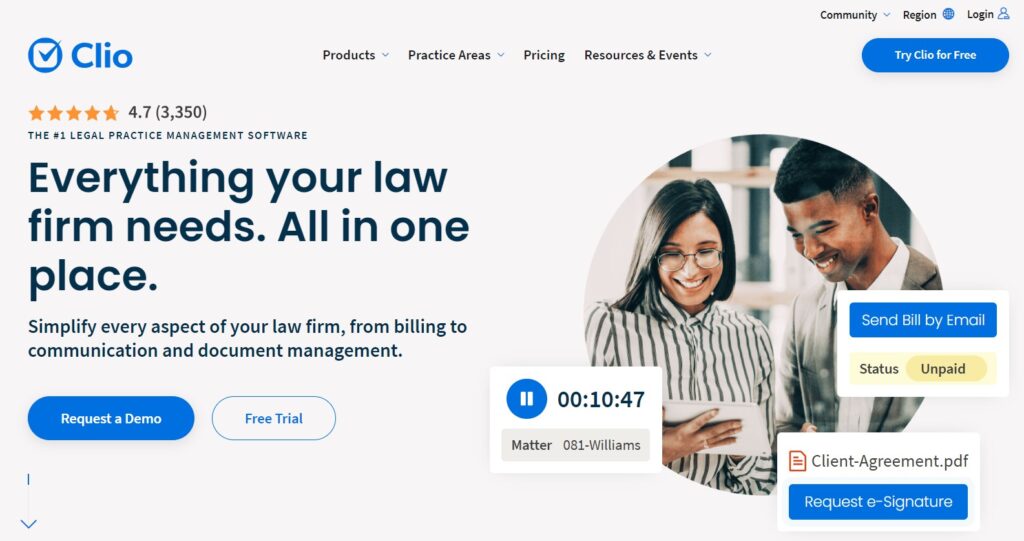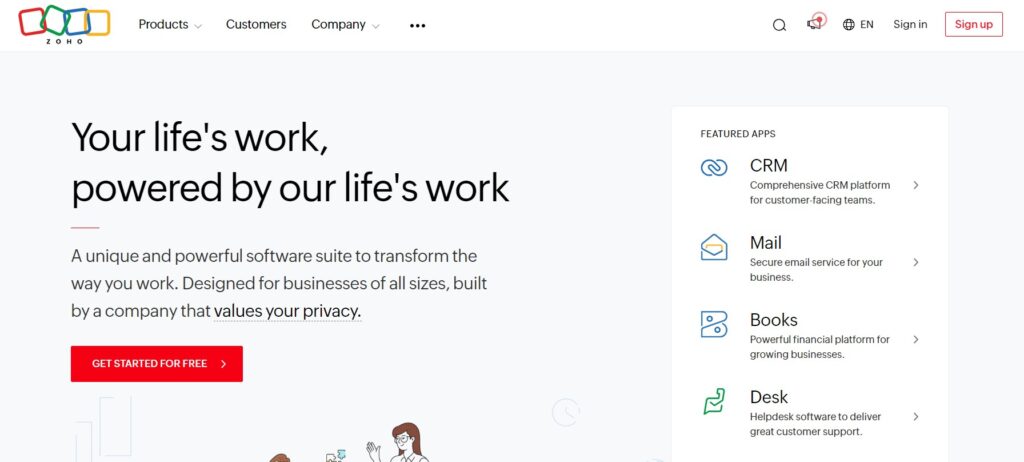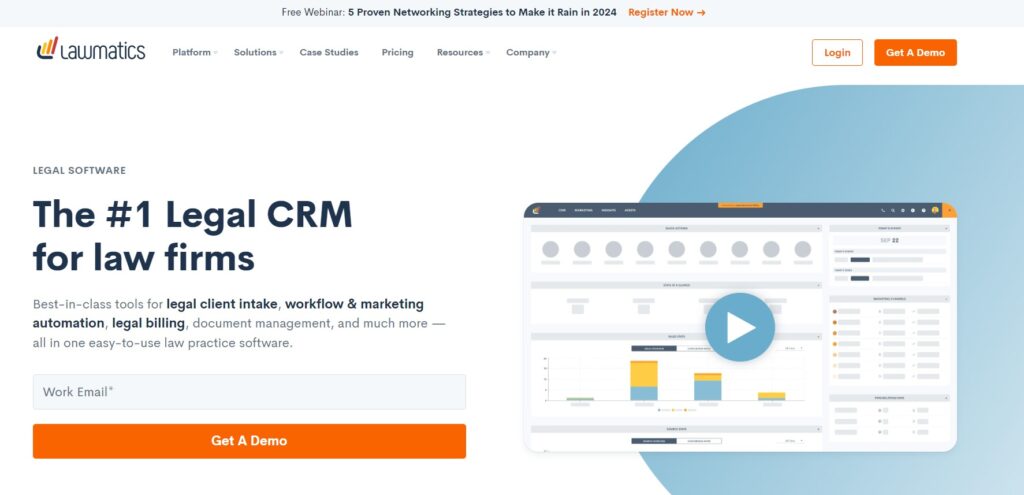
If you’re a Attorney or part of a law firm, you know how important it is to manage your clients and cases effectively
That’s where a good CRM system comes in.
With the right CRM, you can streamline your workflows, track client interactions, and stay on top of your cases.
But with so many options out there, how do you know which CRM is right for you?
Dob’t worry, we have got your back!
In this blog, we’ll discuss the top 3 CRM systems that we believe are the best fit for attorneys.
What is a CRM Software
Before diving into the top 3 CRM software for law firms, it’s important to understand what a CRM is. Customer relationship management (CRM) software is a tool that helps attorneys manage interactions with their clients, automate repetitive tasks, and automate sales processes.
Moreover, it provides detailed insights into customer behavior. It stores valuable information about clients, including their contact details, communication history, and previous purchases.
In the legal industry, CRM software manages clients, tracks case progress, and communicates with clients effectively.
This platform ensures that all users have access to real-time client data that is updated automatically whenever clients take action.
This has a significant impact on team productivity as they no longer have to share Excel sheets or demand data from other departments. Additionally, it improves the client experience by providing a seamless and streamlined process.
Why CRM is important for Attorneys?
Here are some specific reasons why CRM is important for attorneys:
Efficient Contact Management: Attorneys have to manage a large number of clients, potential clients, and other stakeholders. A CRM tool can help them to store and manage all their contact details in one place, making it easier to access and manage the information as required. This can help attorneys to stay organized and reduce the chances of missing important information or deadlines.
Improved Client Relationships: A CRM tool can help attorneys to better understand their client’s needs, preferences, and communication preferences. This can enable attorneys to provide more personalized and effective services to their clients, leading to better client relationships, increased client loyalty, and a stronger reputation.
Improved Data Security: A CRM tool help attorneys protect their confidential client data and documents from unauthorized access. By implementing the latest security protocols and practices, attorneys can reduce the risks of data breaches and ensure compliance with data protection regulations.
How should you choose a CRM?
As the demand for CRM software grows, many new companies are offering solutions for law firms and other industries that can benefit from the technology. However, it can be challenging to choose the right CRM solution for your law firm.
To ensure that you select the best option for your needs, here are some essential features that your legal CRM solution should have.
Case Management:
Managing and tracking all interactions between your law firm and a client is crucial for providing excellent service. A legal CRM solution with case management features can help you keep track of all interactions on any communication channel, allowing you to better understand your client’s needs and preferences. You can categorize and manage requests, review cases and resolutions, and aggregate information to improve your services and business processes.
Data Security:
As a law firm, you deal with highly sensitive and confidential information daily. Your legal CRM solution should provide advanced data security features to protect your data from cyber-attacks and unauthorized access. This may include encryption, two-factor authentication, authorized IP addresses, and other security measures.
Marketing Automation:
Marketing automation is a crucial aspect of effective sales and requires access to comprehensive data. By utilizing a CRM solution, you can obtain valuable insights about your contacts, which can help you guide leads through the sales funnel to conversion.
With personalized and timely communication, you can target specific clients and optimize your marketing efforts. With the right CRM solution that integrates marketing automation capabilities, your sales and marketing teams can work together toward achieving your business goals, such as increasing sales and revenue.
Client Intake Management:
Automating your client intake process can improve your workflow, organization, and data entry. It can also provide your clients with a better experience and allow you to track and analyze your data more effectively.
With a legal CRM solution, you can generate online forms, schedule appointments, receive documents, and more. All of the data you receive is automatically stored, and you can see at what stage of the process the contact is.
Document Management:
Managing documents is an essential part of running a law firm. Storing all of your documents digitally in one place can help you reduce paper use, organize your files more efficiently, and easily find what you need. A legal CRM solution should offer robust document management features, allowing you to store, organize, and retrieve documents easily and securely.
Top 3 CRM for Attorneys and Law firms
1. Clio
Clio is a cloud-based practice management software designed to help legal professionals manage their day-to-day operations more efficiently. The platform provides a comprehensive set of features that includes case management, client management, time tracking, billing, and accounting.
One of Clio’s strengths is its user-friendly interface, which makes it easy for both technical and non-technical users to navigate the platform.
It also provides integrations with other popular software such as QuickBooks, Dropbox, and Microsoft Office, enabling seamless data transfer between different applications.
Clio’s mobile app is another great feature, allowing users to manage their workload while on the go. The app is available for both iOS and Android devices.
Clio’s customer support team is available 24/5, providing users with assistance whenever they need it.
Overall, Clio is an excellent practice management software that provides legal professionals with the tools they need to manage their workload efficiently.
Pros:
- Virtual phone lines
- Several plans to choose from
- Starts at a reasonable $39/month
- There are multiple existing 3rd party integrations to choose from.
- Automated email campaigns
- Unlimited document storage
- A bank-grade security system
- Detailed time-tracking and billing feature
Cons:
- To gain access to credit card processing you need to pay $59/month or higher pricing plan
- Reporting options are somewhat limited
- Clio does not allow a “User” custom field
2. Zoho CRM
Zoho CRM is a popular cloud-based customer relationship management software that provides businesses with the tools they need to manage their sales, marketing, and customer support operations.
Although Zoho CRM was not specifically designed for law firms, it provides all the essential features required in a law firm’s CRM. It enables firms to manage client relationships effectively and streamline marketing and sales processes, automating them where necessary.
Through Zoho CRM, law firms can interact with clients using various communication channels such as email, phone, social media, live chat, and portals. Additionally, it offers a one-click dial feature and analytics to track call data, among other useful features.
Pros:
- User-friendly interface.
- Provides a comprehensive set of features, including lead management, pipeline management, contact management, and sales forecasting
- Offers mobile app for iOS and Android devices
- Integrates with other popular software such as Google Suite, Microsoft Office, and MailChimp
- Provides 24/7 customer support and an extensive knowledge base to assist users
- Affordable tool with pricing starting at $14
Cons:
- Limited mobile app features
- Limitations in running campaigns
Lawmatics is a legal-specific CRM that is designed to cater to the needs of Attorneys and law firms. It streamlines and automates the entire client intake process, from lead generation to onboarding, to keep your workflow organized and efficient.
It is an all-in-one solution that includes features such as lead management, appointment scheduling, document automation, and billing. Lawmatic offer several pricing plans with and its cheapest plan starts at $199/mo.
Pros:
- User-friendly intuitive interface
- Built-in scheduling tool for meetings
- Provides a seamless and automated client intake process
- Offers document automation features to streamline document creation
- Includes appointment scheduling and billing features
- E-mail marketing features
- Advanced analytics
- Legal-specific CRM that caters to the needs of Attorneys and law firms
- Provides real-time analytics and reporting to track performance and progress
Cons:
- Can be expensive for small law firms or solo practitioners
- The platform is complex and may require some training to use effectively
Conclusion
To sum up, a CRM system is an essential tool for attorneys and law firms, as it helps to manage client interactions and streamline operations.
With so many CRM options available in the market, it can be overwhelming to choose the right one for your needs. Each of the CRM systems discussed above provides a comprehensive set of features to meet the needs of legal professionals.
Ultimately, the right CRM system for your law firm will depend on your specific requirements, budget, and preferences.
By carefully evaluating your options and choosing the CRM system that best fits your needs, you can improve your firm’s productivity, client relationships, and profitability.



